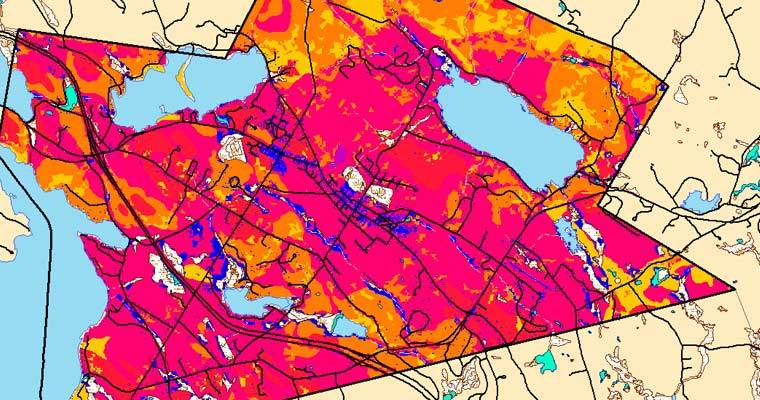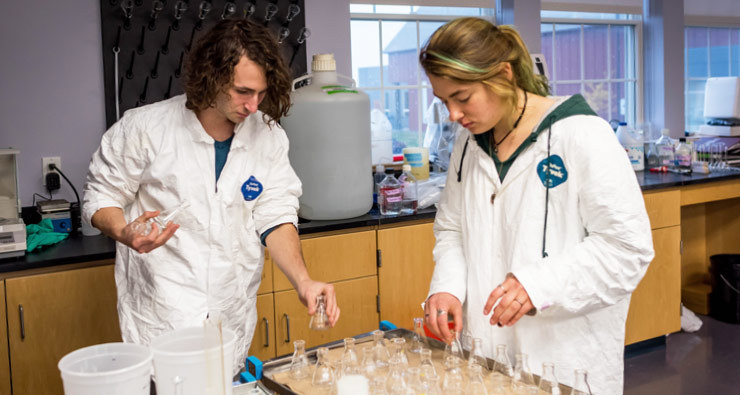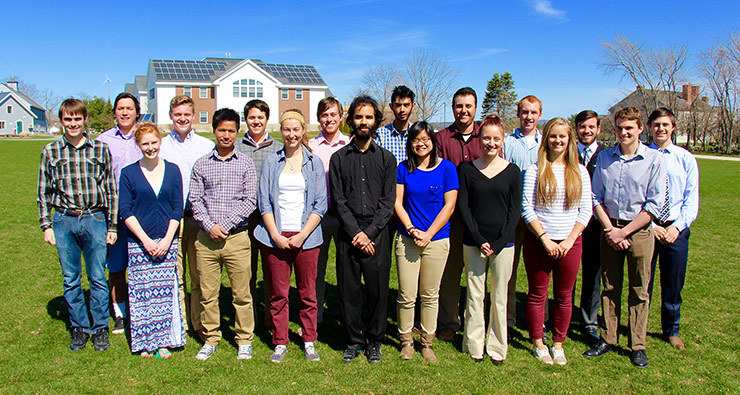Research
IDea Network of Biological Research Excellence
Participation in New Hampshire IDea Network of Biological Research Excellence (NH-INBRE) projects open educational, intellectual and professional doors that change lives.
Supported by the National Institutes of Health, NH-INBRE is led by the state's two research institutions, Dartmouth College and the University of New Hampshire, in collaboration with eight undergraduate institutions, including Colby-Sawyer. The partnership provides you with advanced research opportunities including paid assistantships with Colby-Sawyer faculty, access to the Summer Undergraduate Research Fellowship (ISURF) program at Dartmouth College, and opportunities to participate in original research projects throughout the state network.
Conservation Agency Collaboration
Gain valuable hands-on experience through a research partnership with the Sullivan County Conservation District.
Conduct high-tunnel greenhouse research that helps local farmers increase productivity during a paid summer internship. Test the impact of subsoil plowing on soil quality, investigate the latest technologies in high-tunnel farming and present findings to the Colby-Sawyer community during your senior Capstone research presentation.
Community-Based Research Project
The community-based research project — during your third year of study — is the defining characteristic of the environmental studies and environmental science programs.
Immerse yourself in an in-depth, team-based analysis of a local environmental problem or issue through traditional classroom and laboratory exercises as well as detailed field work and extended site visits. Expand your research and presentation skills through collaboration with clients, community members and local officials as you develop valuable resources and tools to protect and educate the community about important environmental assets.

2019-20 Project: Resilience in New London
The 2019-2020 Community-Based Research Project worked with the Town of New London, New London Hospital, and Colby-Sawyer College to improve resilience in community. Working with these stakeholders, the class identified areas where the community could improve food, water, and energy system resilience to both thrive day-to-day and prepare for potential disturbances.
The project adapted to address resilience as our systems were strained during the coronavirus pandemic. The class transitioned to remote learning during the spring semester but continued to work together remotely with a newfound urgency amid the pandemic. The report includes recommendations for the new Main Street Garden, agricultural land protection, food education, storm water management, sustainable investment at Colby-Sawyer College, energy emergency management, an energy decent action plan, and a greenhouse gas inventory for the town.
2019-20 Project Documents

2017-18 Project: Phosphorus Load Assessment of Municipal Sewerage Systems & Public Outreach Proposals
The 2017-2018 Community-Based Research class partnered with community members to investigate the concentrations of phosphorus in the town’s wastewater. Students in the yearlong class collected data, compiled information, conducted a survey and developed a public outreach plan to reduce the phosphorus input.
Project Document: New London Wastewater Phosphorus Load Assessment

2015-16 Project: Colby-Sawyer College Landscape Management
The 2015-2016 Community-Based Research class developed a comprehensive landscape management plan to assist in decision-making related to ongoing maintenance and development of the campus in ways that promote the ideals of the college, the needs of stakeholders and general sustainability. The plan included general suggestions as well as specific designs for areas of campus with high change potential to the existing landscape. A phasing outline and a cost-benefit analysis were also included to assist in prioritizing implementation.
2015-16 Project Documents
- Landscape Management Research Executive Summary
- Mid-Project Presentation
- Landscape Management Plan
- Forest Management Plan
- Colby-Sawyer Planting Palette
- Landscape Management Plan Presentation